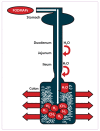Low-FODMAP Diet for Treatment of Irritable Bowel Syndrome
- PMID: 24672410
- PMCID: PMC3966170
Low-FODMAP Diet for Treatment of Irritable Bowel Syndrome
Abstract
Functional bowel disorders, including irritable bowel syndrome (IBS), are common disorders that have a significant impact on patients' quality of life. These disorders present major challenges to healthcare providers, as few effective medical therapies are currently available. Recently, there has been increasing interest in dietary therapies for IBS, particularly a diet low in fermentable oligosaccharides, disaccharides, monosaccharides, and polyols (FODMAPs). Since ingestion of FODMAPs increases the delivery of readily fermentable substrates and water to the distal small intestine and colon-which results in luminal distention and gas-the reduction of FODMAPs in a patient's diet may improve functional gastrointestinal symptoms. This paper will review the pathophysiology of IBS and the role of FODMAPs for the treatment of this condition.
Keywords: FODMAPs; Irritable bowel syndrome; food allergy; food intolerance; hydrogen breath testing; small intestinal bacterial overgrowth.
Figures



References
-
- Longstreth GF, Thompson WG, Chey WD, Houghton LA, Mearin F, Spiller RC. Functional bowel disorders. Gastroenterology. 2006;130:1480–1491. - PubMed
-
- Hungin AP, Chang L, Locke GR, Dennis EH, Barghout V. Irritable bowel syndrome in the United States: prevalence, symptom patterns, and impact. Aliment Pharmacol Ther. 2005;21:1365–1375. - PubMed
LinkOut - more resources
Full Text Sources
